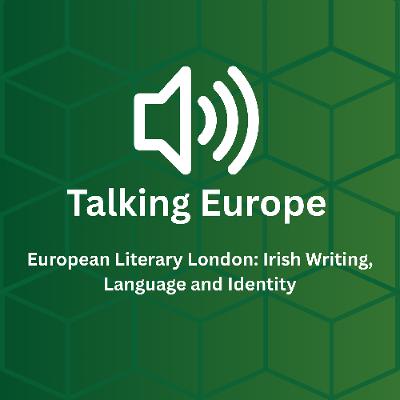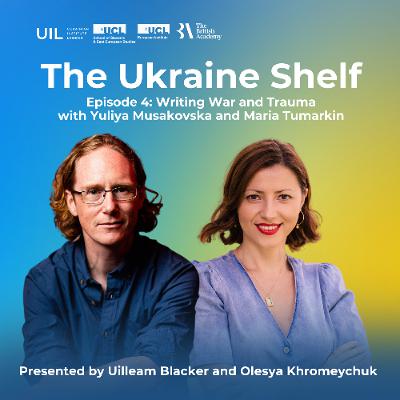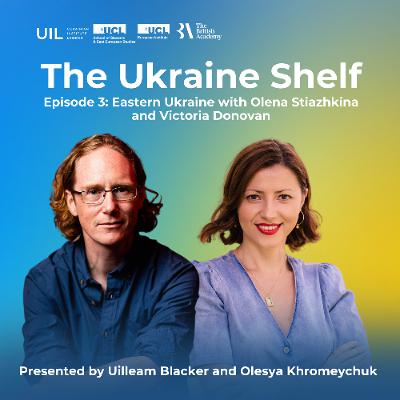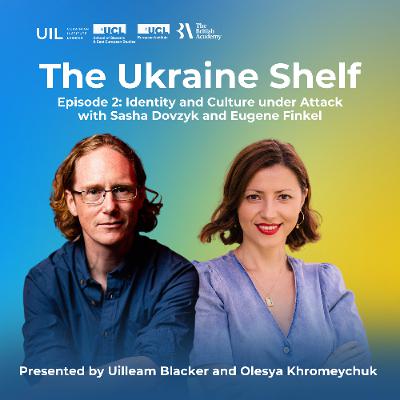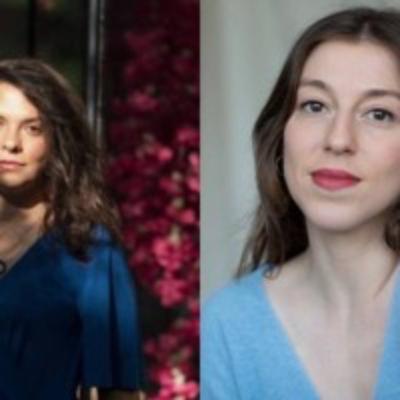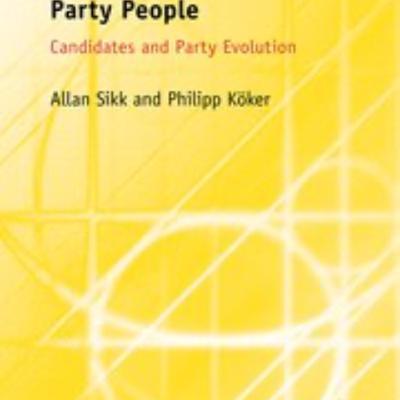Discover Talking Europe: The UCL European Institute podcast
Talking Europe: The UCL European Institute podcast

48 Episodes
Reverse
In this episode, we talk about one of the most fundamental things in all our lives: food. How can food help us understand culture, identity, and history? How does food bring people together in dark times? How has Ukraine’s status as a major global exporter of food been affected by the war? We discuss all these questions and more with two brilliant food writers - Olia Hercules and Felicity Spector.
Olia Hercules is a British-Ukrainian chef, author and cultural ambassador, she is the author of Mamushka: Recipes From Ukraine & Beyond; Kaukasis: The Cookbook – A Journey Through the Wild East; Summer Kitchens Inside Ukraine's Hidden Places of Cooking and Sanctuary; Home Food and most recently Strong Roots: A Ukrainian Family Story of War, Exile and Hope (Bloomsbury, 2025).
Felicity Spector is a journalist, author and baker. Her work in TV journalism has taken her all over the world, covering everything from the Velvet Revolution in Czechoslovakia to the inauguration of Barack Obama in the US; most recently, she has been a tireless volunteer in some of Ukraine’s most war-torn regions. Her book about these experiences, Bread and War: A Ukrainian Story of Food, Bravery and Hope, was published in 2025 by Duckworth.
Book recommendations:
Olia Hercules:
Lesya Ukrainka, The Noblewoman, translation. Percival Cundy, in Spirit of Flame: A Collection of the Works of Lesya Ukrainka (Bookman Associates, 1950). Translation available online here.
Charlotte Shevchenko-Knight, Food for the Dead (Penguin, 2024)
Lina Kostenko’s poetry (See here for some translations by Uilleam Blacker at Words Without Borders)
Felicity Spector:
Oleksandr Mykhed, The Language of War translation. Maryna Gibson, Hanna Leliv and Abby Devar (Penguin, 2024)
Artur Dron, We Were Here, transl. Yuliya Musakovska (Jantar, 2024)
Victoria Belim, The Rooster House (Virago, 2023)
Also mentioned:
Lesya Ukrainka, Cassandra trans. Nina Murray (Harvard, 2024)
Oleksandr Mykhed, I Will Mix Your Blood with Coal transl. Tanya Savchynska and David Mossop (Northwestern University Press, 2025)
Links
The UCL European Institute Ukraine Shelf: https://www.ucl.ac.uk/european-instit...
UCL European Institute newsletter: https://ucl.us5.list-manage.com/subsc...
UCL European Institute instagram: ucl_ei
UCL European Institute BlueSky: https://bsky.app/profile/uclei.bsky.social
Ukrainian Institute London: https://uil.org.uk
This episode of Talking Europe focuses on a unique literary project that underscores the enduring cultural ties between the UK and the rest of the European continent: the interactive, online European Literary Map of London devised by University College London's European Institute. Highlighting London’s relevance for European culture and in particular for European writers. Dr Uta Staiger Director of the UCL European Institute and curator of the project discusses the project and the wider relationship of London and European Literature with European authors Ciara Broderick (Ireland), Nisrine Mbarki (The Netherlands), Domas Raibys (Lithuania) and Iryna Shuvalova (Ukraine) and her UCL colleague, Lucy Shackleton.
In this episode of our podcast 'Talking Europe', Hayley Anderson, one of our 2024-25 Student Ambassadors, sits down with Ciara Broderick, the UCL 2025 European Literary Map of London Writer in Residence. Their conversation delves into Ciara’s journey as a writer, her experiences settling into London, and the creative process behind her upcoming short story for the Literary Map. Together, they explore themes of writing, language, and identity—examining how the Irish language shapes both Ciara’s work and her sense of self.
This episode was produced in collaboration with the UCL Platform for Linguistic and Epistemic Justice (PLEJ). PLEJ is a research centre based at UCL's School of Slavonic and East European Studies. Its focus is to place socio-cultural linguistic research front and centre among the interdisciplinary areas of enquiry with social impact at SSEES, UCL, and beyond.
About our guests
Ciara Broderick
Irish prose and poetry writer Ciara Broderick is our 24/25 Writer in Residence. Ciara's work has been published in several Irish and international journals and in 2025 her first novel was selected as a winner of the Irish Writers Centre Novel Fair. During her four-week residency in London, Ciara has been based at UCL Faculty of Arts & Humanities and engaged closely with UCL academics and students, participated in various related events, and pursued her own writing.
Hayley Anderson
Hayley is one of the Student Ambassadors at the UCL Europe Institute for 2024/25. She is a fourth-year European Social and Political Studies student. With her specialism in Hungarian and History, she has focussed her research on the experiences and identities of communities in Eastern Slovakia and the wider Central East Europe region.
How can we speak and write about war? What role does silence play in this process? What does it mean for people and places to survive war? We discussed these questions and more with two brilliant writers, Maria Tumarkin and Yuliya Musakovska, whose works have interrogated war and trauma in uncompromisingly honest and perceptive ways.
For more information, visit our webpage: https://www.ucl.ac.uk/european-institute/ukraine-shelf-episode-4-writing-war-and-trauma
In this episode, we explore the industrial regions of Donetsk and Luhansk. From 2014 until 2022, this was where Russia focused its war of aggression against Ukraine, killing and uprooting thousands of people. Russia claimed these regions were culturally and historically Russian, but history, and the people of these regions themselves, tell a different story: the majority consider themselves Ukrainian, and they overwhelmingly voted for Ukrainian independence in 1991. To get a better understanding of this region’s complex identities and its history as a resource-rich region on the edge of empire, we spoke to Professor Victoria Donovan of the University of St Andrews about her book Life in Spite of Everything (Daunt Books, 2025) and to historian and novelist Olena Stiazhkina about her novel Cecil the Lion Had to Die (Harvard, 2024).
More here: https://www.ucl.ac.uk/european-institute/ukraine-shelf-episode-3-eastern-ukraine-olena-stiazhkina-and-victoria-donovan
Russia has attempted to repress and destroy Ukrainian statehood and identity over two centuries. In this episode, we trace the historical roots of Russia’s current aggression to imperial myths from the early 19th century, and look at how these myths have resurfaced repeatedly over time. We explore the most recent wave of violence through the tragic story of Victoria Amelina, a Ukrainian writer who was killed in a Russian missile attack in 2023. The books under discussion are Eugene Finkel’s Intent to Destroy: Russia’s Two Hundred Year Quest to Dominate Ukraine (Basic Books, 2024) and Victoria Amelina’s Looking at Women Looking at War (Harper Collins, 2025).
See more: www.ucl.ac.uk/european-institute…lture-under-attack
Russia’s aggression against Ukraine began not in 2022, but in 2014, with the invasion and occupation of Crimea. This episode explores Crimea’s significance as a strategically important nexus between east and west, between Europe, Russia and the Middle East, and as an integral part of Ukraine historically, politically and culturally. The focus of our discussion is Rory Finnin’s book Blood of Others: Stalin’s Crimean Atrocity and the Poetics of Solidarity (University of Toronto Press, 2022).
https://www.ucl.ac.uk/european-institute/ukraine-shelf-episode-1-crimea-elmaz-asan-and-rory-finnin
A soundscape commissioned as part of the UCL European Literary Map of London project, featuring voices reading texts about London written by European writers across the centuries in a variety of original languages and in English translation.
In conversation with Olivia Scher, our European Literary Map of London Writer-in-Residence Joanna Elmy and writer, artist and director, Larisa Faber Larisa Faber talk about London: journeys, languages, writing and cultures. This episode explores central themes of identity, belonging, and how London shapes and is shaped by its rich tapestry of stories.
European Literary Map of London: https://www.ucl.ac.uk/european-institute/lost-found-european-literary-map-london
Bulgarian-born author and journalist Joanna Elmy was our 23/24 inaugural Writer in Residence. Joanna’s first novel Born of Guilt, written during her years in university, received a prestigious Bulgarian prize for emerging literature in 2022 and was shortlisted for several other national awards. During her four-week stay at UCL (24 April – 22 May 2024), Joanna engaged with academics across faculties, and worked on her second novel which features London prominently and explores ‘cities of the world’ – a modern take on urban spaces partly inspired by Italo Calvino’s approach to writing the city.
Writer, director and actor Larisa Faber collaborated with UCL European Institute and the UCL Faculty of Arts and Humanities in the summer term of 2024, in the context of the European Literary Map of London project, and an ongoing partnership with EUNIC London, the European Literature Network and the European Writers’ Festival, curated by Rosie Goldsmith. Larisa worked to develop an irreverently multivocal text about the politics of seasonal vegetables – which will feature on the European Literary Map of London as the first Luxembourgish entry.
Allan Sikk, Associate Professor in Comparative Politics at the School of Slavonic and East European Studies, University College London, and Philipp Köker, Lecturer Political Science at Leibniz University Hannover join ‘Talking Europe’ to discuss their new book on political parties, how they change, and what this has to do with the people who make them up.
Party People: Candidates and Party Evolution is published with Oxford University Press, and available in hard cover, e-book and audiobook.
In conversation with Claudia Sternberg of the UCL European Institute, Allan and Philipp discuss why party systems have changed so radically across Europe, what we can learn from looking at parties in Central and Eastern Europe, and in what ways their analysis of 200,000 electoral candidates from over 60 elections across nine CEE democracies helps us to understand party change more broadly, including candidate turnover, party fission and fusion, programmatic change, and party leadership change.
European Literary Map: Ion Codru Drăguşanu read in Romanian by Oana Borlea-Stancioi by Talking Europe: The UCL European Institute podcast
European Literary Map: Ion Codru Drăguşanu read in English by Oana Borlea-Stancioi by Talking Europe: The UCL European Institute podcast
European Literary Map: Elif Shafak read in English by Olivia Scher by Talking Europe: The UCL European Institute podcast
European Literary Map: Hans Christian Andersen read in Danish by Vincent Rasmussen by Talking Europe: The UCL European Institute podcast
European Literary Map: Hans Christian Andersen read in English by Vincent Rasmussen by Talking Europe: The UCL European Institute podcast
European Literary Map: Hector Berlioz read in English by Yanis Fekar by Talking Europe: The UCL European Institute podcast
European Literary Map: Hector Berlioz read in French by Yanis Fekar by Talking Europe: The UCL European Institute podcast
European Literary Map: Susanna Alakoski read in English by Annika Lindskog by Talking Europe: The UCL European Institute podcast
European Literary Map: Susanna Alakoski read in Swedish by Annika Lindskog by Talking Europe: The UCL European Institute podcast
European Literary Map: Susanna Alakoski read in English by Annika Lindskog (East End) by Talking Europe: The UCL European Institute podcast



